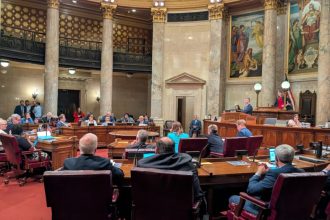LANSING — Michigan state government began Oct. 1, the first day of the 2026 fiscal year, with no state budget, but with Gov. Gretchen Whitmer insisting there was no partial state government shutdown, either.
The question of whether a shutdown ever happened quickly became an academic one, as lawmakers in both chambers passed a nearly $1.6 billion continuation budget by 1:50 a.m., appropriating enough money to fund state government for one week.
Lawmakers passed their continuation budget as a federal government shutdown began early on Oct. 1 in Washington, D.C.
Continued work to finalize the 2026 state budget was to resume at the Capitol in Lansing later in the morning on Oct. 1, with many budget details still not made public. Much work remains, but Whitmer and lawmakers bought themselves extra time.
Article 9, Section 17 of the Michigan Constitution says: “No money shall be paid out of the state treasury except in pursuance of appropriations made by law.”
In a departure from past practice and historical interpretations of the constitution, Whitmer, with the support of legislative Republicans, said Sept. 30 that state operations would continue as normal, and state employees would continue working and getting paid, with or without a finalized budget agreement, which she and lawmakers said they expected before the end of the week.
Lawmakers from both parties were saying a continuation budget was an option, but not a requirement.
Rep. Alabas Farhat, D-Dearborn, a member of the House Appropriations Committee, told reporters at about 6 p.m. that a continuation budget was only one option on the table. Asked how state government could continue to be funded after midnight without a continuation budget, he pointed to executive powers and emergency powers of the governor.
Rep. Bryan Posthumus, R-Rockford, the House Majority Floor Leader, told the Detroit Free Press that the state can incur expenses without appropriating money, it just can’t pay bills. There is a lag of more than a week between the hours state employees work and when they actually get paid by the state, he said. The state has good credit with contractors and other vendors and it is not worth the hassle to partially shut down state government for 24 to 48 hours while the budget is finalized, said Posthumus, who added that he considers himself a constitutional purist.
Posthumus said a continuation budget was possible but he did not think it necessary. All the big items are resolved between Republicans and Democrats and only a few details remain to be hashed out, he said. Republicans have called for spending cuts in budget negotiations and Posthumus said the final budget will have a general fund — the state’s main checking account — that is $800 million smaller than the current year general fund.
Still, despite all the talk that there was no partial shutdown, the Legislature quickly and overwhelmingly passed House Bill 4161, to fund state government until Oct. 8. The Michigan Senate passed House Bill 4161 at 1:30 a.m. on Oct. 1, in a 31-2 vote. The Michigan House followed suit about 20 minutes later, in a 103-4 vote. It was not immediately known how quickly Whitmer signed the legislation, but Michigan’s non-shutdown shutdown lasted at least two hours.
Many details about the proposed budget had not been released, including the gross budget amount, how much individual state agencies would have to spend or what the per-pupil grant for K-12 schools would be. But Farhat said a program of universal free breakfasts and lunches in K-12 schools, launched by the Whitmer administration in 2023, would continue into 2026.
Lawmakers were also considering changes to a 24% wholesale tax on marijuana, part of a plan to raise more than $1.5 billion annually to fix roads and bridges, after hundreds of people demonstrated at the Capitol Sept. 30 against the proposed tax, describing it as a killer of jobs and Michigan’s marijuana industry.
At midnight on Sept. 30, ahead of legislative action on the continuation budget, Whitmer’s office released a memorandum she sent to State Budget Director Jen Flood, citing the governor’s “constitutional duty to protect the health and welfare of Michiganders.”
That move came as lawmakers, who on Sept. 25 joined Whitmer in saying they had an agreement to finalize a budget by Oct. 1, said nearly all outstanding issues had been resolved but time was needed for drafting and printing and for all lawmakers to digest the materials.
In the one-paragraph memo to Flood, Whitmer said the Legislature had not fulfilled its constitutional obligation to pass a budget for the 2026 fiscal year that began Oct. 1. Whitmer said it was “critical to maintain continuity of government operations and services to support public health and welfare,” and she authorized Flood “to take the necessary steps to release payments to support those continuing government operations.”
A few hours earlier, Whitmer, House Speaker Matt Hall, R-Richland Township, and Senate Majority Leader Winnie Brinks, D-Grand Rapids, had issued a joint statement that said government operations would continue as normal in the coming days but did not specify how.
Michigan Gov. Gretchen Whitmer (center) and Senate Majority Leader Winnie Brinks and House Speaker Matt Hall bought themselves more time to finalize the 2026 budget when lawmakers approved funding to run state government for one week, early in the morning of Oct. 1.
“State government will continue and work will go on in the Legislature to finalize a balanced, bipartisan state budget this week,” Whitmer said in the joint statement.
In 2009, to comply with spending requirements in the state constitution, the Legislature passed a 30-day “continuation budget,” ending a partial state government shutdown that lasted about two hours. In 2007, when another partial shutdown lasted a few hours, Mitch Bean, who was then director of the nonpartisan House Fiscal Agency, said in a memo to the Legislature that the state would have no authority to spend money if a budget was not approved by Oct. 1. And in 2019, when officials ultimately reached a budget agreement shortly before the start of the 2020 fiscal year, then Department of Technology, Management and Budget spokesman Kurt Weiss said that closure of state parks and Secretary of State branch offices would be among the first impacts the public would notice if a budget wasn’t finalized by Oct. 1.
Whitmer also emailed state employees Sept. 30 to assure them they would be able to keep working and getting paid, even if the budget was not completed by midnight.
“All state government operations will continue as normal on Oct. 1 and in coming days as [the budget] is finalized,” the email said.
Voting no on the continuation budget were: Sen. Jonathan Lindsey, R-Coldwater; Sen. Jim Runestad, R-White Lake; Rep. Steve Carra, R-Three Rivers; Rep. James DeSana, R-Carleton; Rep. Jaime Greene, R-Richmond; and Rep. Tom Kunse, R-Clare.
Though assertions that the state could operate for the short term without a budget represent a new idea for Michigan, they are not without national parallels.
Pennsylvania has a history of continued operations during budget impasses, the nonpartisan news outlet Spotlight PA reported in 2023.
In 2009, the Pennsylvania Supreme Court added state employee paychecks to a list of legally protected spending, meaning state parks and driver’s license centers could continue operating as usual, at least in the short term, just as state prisons and police do, Spotlight PA reported.
Contact Paul Egan: 517-372-8660 or pegan@freepress.com.
This article originally appeared on Detroit Free Press: Michigan lawmakers act to avert state shutdown for at least a week









